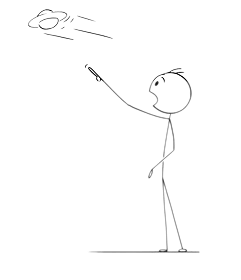This post is an idea derived from a story that I encountered sometime recently, enough to remember and write about. As I’m typing the words out, I’ve already forgotten the complete story, but I recall the gist of it. So, instead of going from word to word, I’ll have to rephrase a lot. Damn, not even two lines are finished, and I’ve ended up contradicting myself. What a life! For the sake of limited writing, I’m only presenting my opinion, which is more of a question through my opinion to understand if it’s okay to intentionally get rejected instead of letting someone feel pity for you in the future because you had a chance of getting help from them but you didn’t approach them. I’ll be really honest, as each line goes by, I remain unsure of what I’ve to write, but let’s proceed –

The idea that I proposed during the conversation was simple (and stupid) —
Ask them to specifically say ‘no’ when you ask for their help. And since you’re hesitant to ask for their help because you know they’ll not help you, it’s better to intentionally face the rejection rather than meeting them in future and letting them know how you needed their help, so they can say ‘you could have asked for my help’, but in reality, you were thoroughly aware of this fact that you’re not going to get any help from them. Paradoxical.
The negative side of this idea is — You miss 100% of the shots you don’t take. However, looking at the positive side, you’re making progress towards reducing your reliance on this particular individual. Instead of seeking help, despite of the situation you’re in, you can initially take a step forward and give yourself a room to trust your own capabilities to at least address issues and then make an attempt to fix it in bits and pieces.
This made me realize how the hope for help can paralyze you to the point where all you hope for is help. It’s an endless cycle, like an Ant Mill.
An ant mill is an observed phenomenon in which a group of army ants, separated from the main foraging party, lose the pheromone track and begin to follow one another, forming a continuously rotating circle. This circle is commonly known as a “death spiral” because the ants might eventually die of exhaustion.
The only difference is that, instead of slowly killing yourself with exhaustion, you’re gradually letting yourself drown in guilt, but with the hope that somebody will throw a life jacket at you. The ladder of expectation is quite endless, and sometimes it’s better to accept that there will be no help available, so you must prepare yourself for what’s coming and what might come. Again, what I said to him and what I’ve written so far are merely my opinions rather than advice or enforcement. The thought of asking someone to say ‘no’ to your face when you need their help, but you’re also allowing yourself to not seek help all the time, sounds dramatic. However, I think if done swiftly, you can be somewhat free from the rusted chains you intentionally tied yourself to.
When I started this post, I thought of writing the whole conversation, but it carries a lot of irrelevancies in the context of what my afterthoughts are. I’ll be honest, I’m missing lots of bits and pieces, but I think I took out what I needed to, and it seems enough for me to not think about it any further.